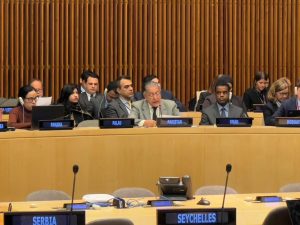
Statement by Ambassador Munir Akram
On Behalf of the Like-Minded Group at the Informal Consultations on Preparations for the Summit of the Future
Co-Facilitators,
1. I have the honour of delivering this statement on behalf of a Like-Minded Group of delegations: Algeria, Bolivia, Brazil, China, Cuba, Egypt, Eritrea, Islamic Republic of Iran, Libya, Nicaragua, Nigeria, Russian Federation, Sri Lanka, Syrian Arab Republic, Venezuela, Zimbabwe, and my own delegation, Pakistan. We align ourselves with the statement delivered by the Group of 77 & China.
2. At the outset, we are gravely concerned with the situation in the Middle East. In accordance with the resolution adopted by the resumed 10th Emergency Special Session of the General Assembly on 27th October, we call for an immediate humanitarian ceasefire, unimpeded humanitarian access, and a stop to forced transfer of the population in Gaza.
Co-Facilitators,
3. We thank you for convening these informal consultations and take note of your letter dated 19th October 2023 in which you have outlined your approach, timelines and plans for consultations over the coming months.
4. Our Group participated constructively in the consultations held prior to the start of 78th GA session. Important progress was made during that process on “Scope” and “Elements”, although we could not reach final consensus, as the silence procedure was broken on some parts of the above process. Building upon its common positions elaborated earlier, we have the following views on the process and substance going forward:
One, the preparatory process should be in accordance with the intergovernmental nature of the United Nations and of the Summit of the Future. The Summit should adopt a concise, action-oriented outcome document entitled “A Pact for the Future”, agreed in advance by consensus through intergovernmental negotiations, which must accommodate the concerns and priorities of the developing countries. This must reflect on our commitment to achieve consensus and unity in the negotiations.
Two, the negotiations on “A Pact for the Future” should preserve and build upon the areas of agreement and convergence that emerged on the “Elements”. Most importantly, the “Elements” to be included in the “Pact” should be agreed first, before moving on to fleshing out their details. Else, the preparatory process will have no intergovernmental direction. The full eradication of poverty must be an overarching and crosscutting issue across all our negotiations. In this process, we must also take into account the difficulties created by the imposition of illegal Unilateral Coercive Measures on Developing Countries, which directly affect our Peoples in the fight for the eradication of Poverty and in the comprehensive implementation of the 2030 Agenda, reiterating our rejection of these measures and urging their immediate elimination.
Three, “A Pact for the Future” should, inter alia, reaffirm the principles and purposes of the UN Charter; support multilateralism and enhanced international unity and cooperation; commit ourselves in the right direction, which is towards a brighter common future by pursuing common development and common security; call for implementation of UN resolutions regarding development and eradication of poverty as the greatest global challenge; and set out steps to accelerate the achievement of SDGs, including implementation of the “Political Declaration” of the SDG Summit, especially its agreements on financing, Agenda 2030 and the Addis Ababa Action Agenda, while taking into account different levels of development and needs and priorities of all developing countries.
Four, the LMG will continue to align itself with G-77 & China where the Group has submitted proposals, or has a joint position, or may do so in the future. On other areas, where G-77 & China does not have a common position, the LMG will strive to develop such a common position.
Five, Chapter 2 (International Peace & Security) could build on agreed elements of Rev.3 Document, while highlighting the multiple existing and emerging security challenges the world faces and the need to address these in a common, comprehensive, cooperative and sustainable manner, avoiding unilateralism and polarization and fully adhering to the purposes and principles of the UN Charter in their entirety; and respecting international law, in line with relevant UN resolutions, as appropriate. On other aspects, including disarmament, that need to be addressed, the members of the LMG will individually or collectively raise and follow up on their national positions.
Six, Chapter 4 (Youth and Future Generations) should be forward-looking, incorporating the meaningful engagement of Youth in line with the intergovernmental nature of the UN in issues affecting them. The LMG will align itself with G-77 and China on the “Declaration on Future Generations”. It should also equitably address the needs and priorities of current generations, while it addresses those of future generations and must take into account demographic as well as cultural realities and projections
Seven, Chapter 5 (Transforming Global Governance) should have comprehensive and balanced coverage of all institutions which will form part of a new and more equitable global governance arrangement. As noted in Paragraph (e) of the General Assembly’s Decision A/Res/77/568 of 1st September 2023 on the Scope of the Summit of the Future: “the preparatory process of the Summit shall avoid overlaps and duplications with existing intergovernmental processes”. The reform of the three principal UN organs and the strengthening of the Peacebuilding Commission must be accompanied by the reform of the international financial, trade and technology architecture to make it more just, equitable and responsive to the attainment of SDGs and to address the debt crisis being faced by many developing countries.
Eight, the LMG will negotiate the other potential elements of Chapter 5, i.e., Outer Space, Peacebuilding Commission, and cooperation between the United Nations and regional and cross-regional organizations, as a group, in line with the positions it has expressed in the past or in the relevant forums and processes.
Co-Facilitators,
5. The Group will continue to engage constructively with the preparatory process and assures you of its full support and cooperation.
Sub Editor: Ghufran